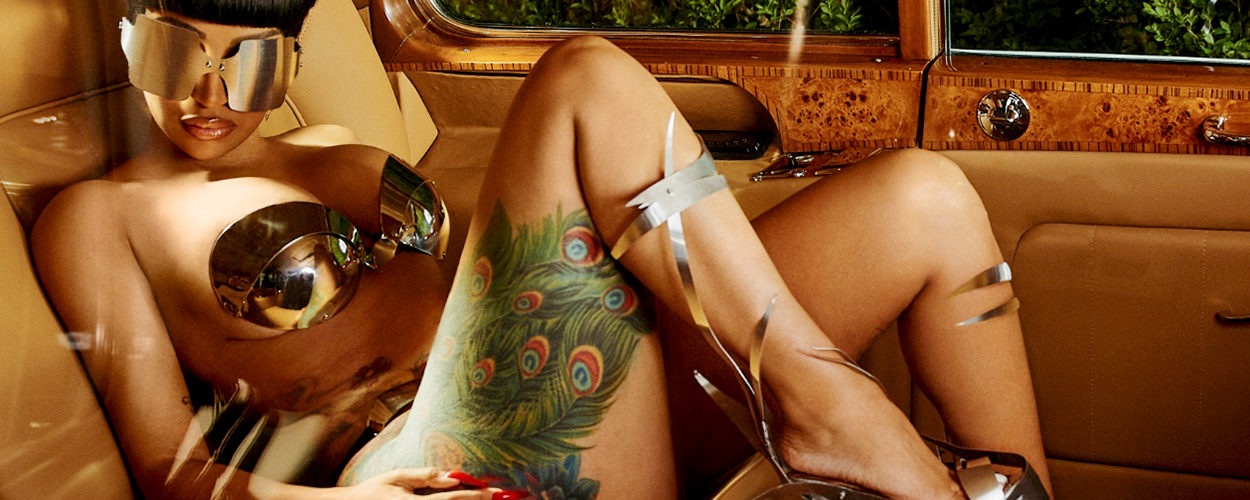This website uses cookies so that we can provide you with the best user experience possible. Cookie information is stored in your browser and performs functions such as recognising you when you return to our website and helping our team to understand which sections of the website you find most interesting and useful.
Artist News Business News Labels & Publishers Legal Top Stories
Cardi B wins publicity rights legal battle over mixtape artwork
By Chris Cooke | Published on Monday 24 October 2022

Cardi B scored another win in court last week when a jury ruled that she did not infringe the publicity rights of Kevin Brophy, the man whose distinctive tattoo design appeared without permission on the cover of her 2016 mixtape ‘Gangsta Bitch Music Vol 1’.
Brophy sued the rapper – real name Belcalis Almánzar – in 2017. A photo of his distinctive tattoo was Photoshopped onto the cover of the 2016 mixtape, so that it appeared on the back of a man who was positioned to look like he was performing oral sex on the rapper.
He argued that the unauthorised use of the tattoo image meant people assumed it was him in the photo, and – given the explicit nature of the artwork – that had resulted in him facing frequent “uncomfortable comments, questions, and ridicule from community members and family”.
The long running dispute finally got to trial last week. A lot of the proceedings – including an eventful testimony from Almánzar herself – focused on whether the rapper had been actively involved in creating the artwork, and also whether people had really connected Brophy to the image before he started talking about it.
Almánzar and her lawyer played down the rapper’s active involvement in creating the artwork and releasing the mixtape, and also honed in on the fact that Brophy had failed to bring any third parties to court who confirmed that they had assumed it was him on the cover.
Though the key legal argument in the case really was whether Almánzar’s use of Brophy’s tattoo design was ‘fair and transformative use’ and therefore allowed under US free speech laws. She argued it was, on the basis that the designer of the ‘Gangsta Bitch Music Vol 1’ cover had only used part of Brophy’s tattoo design and had altered it as he Photoshopped it into the artwork.
That designer, Timm Gooden, testified on Thursday. He confirmed that neither Almánzar nor her team were aware that he had used a chunk of Brophy’s tattoo design from a photo he’d found online. He added that he had assumed his use of the photo and tattoo design was fine, and that Almánzar’s label and management didn’t need to know about it, because it qualified as fair use under his understanding of that concept.
Gooden was more likely thinking about the fair use concept in copyright terms. Brophy wasn’t suing for copyright infringement because the tattooist would arguably be the owner of the copyright in the design.
Almánzar’s lawyer noted on Friday that said tattooist hadn’t sued for copyright infringement, possibly because he accepted that the fair use principle did indeed apply. And, the rapper’s team insisted, the same principle, designed to protect freedom of expression, should also be applied in Brophy’s publicity rights case.
As well as hammering home the fair and transformative use defence on Friday, Almánzar’s lawyer also again stressed that the Brophy side hadn’t presented anyone in court that had independently connected him to the image on the mixtape cover.
Had Brophy never spoken about it, the Almánzar side argued, no one would have ever known part of his tattoo appeared as part of the explicit artwork.
Meanwhile, in his closing arguments, Brophy’s lawyer argued that neither Gooden nor Almánzar’s team had altered the tattoo design enough for the transformative use defence to apply. That would require giving the image “new expression or meaning”, and that hadn’t happened. However, the jury quickly sided with Almánzar.
According to Law360, the rapper welcomed the ruling by telling the crowd that had gathered outside the courthouse: “I’m just grateful. I’m beyond grateful, I even shed a tear … for some people it was probably a little lawsuit but to me, it means a lot to me. It means a lot to my legal team and I want to wish everybody the best of luck. Everybody were really great lawyers, from my lawyers to the plaintiff’s team, it was a very interesting case”.
That final remark demonstrated that – despite Almánzar and Brophy’s lawyer A Barry Cappello sparring in a pretty major way during the rapper’s testimony last week – the mood in court following the jury’s verdict was quite amicable.
Brophy reportedly shook Almánzar’s hand and confirmed he respected her as an artist. Meanwhile, Cappello also shook the rapper’s hand, and – referencing last week’s sparring – she declared, seemingly light-heartedly: “You was mean!”
That contrasts with the events that followed Cardi B’s other court win earlier this year in her defamation legal battle with the YouTuber Latasha Kebe. After the rapper won nearly $4 million in damages, Kebe posted a long and rambling YouTube video declaring she was battling the sinister Hollywood machine and would continue to fight.





